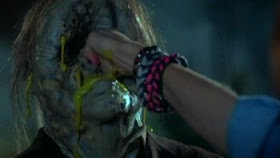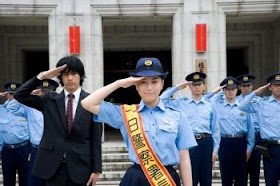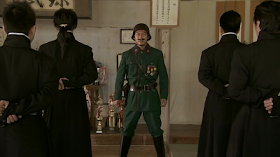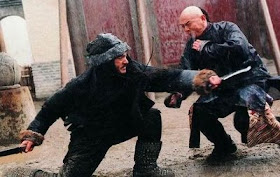
Tuesday, June 30, 2009
203) The Devil Rides Out (1968)

Monday, June 29, 2009
202) Where a Good Man Goes (1999)

201) Expect the Unexpected (1998)

"Death is unavoidable so I think that if there’s some change in the way that I’ve [approached the] topic when I was young, maybe I was more poetically thinking about it. Maybe evil cannot beat the good ultimately. As I get older, my thinking has become, 'Well, sometimes you can choose.'"
Saturday, June 27, 2009
200) Return of the Living Dead Part II (1988)

Friday, June 26, 2009
199) Shallow Grave (1994)

198) The Mirror (1975)
197) Public Enemies (2009)

196) Transformers: Revenge of the Fallen (2009)

Thursday, June 25, 2009
195) Manhunter (1986)

Wednesday, June 24, 2009
194) The Jericho Mile (1979)

193) The Sacrifice (1986)

192) Brüno (2009)
Sunday, June 21, 2009
191) El Rey de la Montana (2007)

190) Seraphine (2008)

189) The Longest Nite (1998)

Friday, June 19, 2009
188) Stalker (1979)
Thursday, June 18, 2009
187) Written By (2009)

RV!: Final Destination (2000)

Wednesday, June 17, 2009
186) Love Exposure (2008)

185) Crime or Punishment?!? (2008)

Tuesday, June 16, 2009
184) Yoroi Samurai Zombie (2008)

183) Encounters of the Spooky Kind (1980)

Monday, June 15, 2009
182) The Eternal Evil of Asia (1995)

Sunday, June 14, 2009
181) The Taking of Pelham One Two Three (1974)

180) Up (2009)

179) Electra Glide in Blue (1973)

Saturday, June 13, 2009
178) 20th Century Boys Chapter 2: The Last Hope

177) 20th Century Boys (2008)

Friday, June 12, 2009
176) Ip Man (2008)

Thursday, June 11, 2009
175) Be a Man! Samurai School (2008

174) Surveillance (2008)
Wednesday, June 10, 2009
173) Warlords (2007)
Monday, June 8, 2009
172) The Naked Spur (1953)

171) The Girlfriend Experience (2009)

As a drama about the deceptively superficial nature of material goods in contemporary society, Steven Soderbergh’s The Girlfriend Experience is an ostentatious success. By following Chelsea (porn star Sasha Grey), an upwardly mobile call girl, screenwriters David Levien and Brian Koppelman ask us to sympathize with the ultimate recession-friendly underdog. As a member of the world’s oldest profession, Chelsea has to constantly reinvent herself and hence struggle to remain competitive in a male-dominated market controlled by clients that pay to emotionally and physically take as much as they can from her. Because she makes a living by putting on a show for them, she rarely lets her guard down to discuss how she “really” feels.
Therein lies the challenge that Soderbergh and company give themselves: stylistically reproducing the frenetic lifestyle of someone that’s constantly being looked at. Her story is jumbled up chronologically, abruptly transitioning from various “appointments” she has with high-powered clients to scenes with her boyfriend Chris (Chris Santos in his debut role). Similarly, to visually affect Chelsea’s harried emotional state, Soderbergh films events in High-Definition DV with a markedly detached aesthetic, focusing more on flashy, high-end building fixtures and decors first and then his equally pretty human subjects.
This impressionistic approach leaves the viewer to in a haze of mood lighting, nanny cam-like photography and structurally devious episodes. For the sake of immersing us into Chelsea’s emotional woes, we are assaulted with a narrative puzzle box that rearranges otherwise garish, pseudo-reality show fodder into an “information age” critique.
Make no mistake, while Chelsea traipses about in designer clothing and lives in a spacious Manhattan loft, the disjointed manner by which her story is told stems from Soderbergh’s ambitious stab at commenting on our media-saturated times. Because there’s so much information to process at once in any given scene of Chelsea’s life, everything is broken down into various interspersed segments. We aren’t deluged by diffuse chunks of information but rather a lot of little slivers. This gives us the illusory impression that we’re being bogged down with the task of determining which scenes go where in order to form a coherent story.
The Girlfriend Experience can subsequently be seen as a movie that aptly reflects contemporary exhaustion with a multimedia deluge of sound bite-sized data. “If I hear one more word about this debate,” Scott whines about the recent presidential debates, “I’m going to throw up. If I hear the word ‘Maverick,’ one more time, I’m going to throw up.” Like cobbling together a holistic view of anything political, or more specifically, anything involving our ailing economy, manufacturing a complex and coherent picture of a working girl’s life from so many diffuse moments is a nigh impossible task. Chelsea subsequently serves as a cipher for both her clients’ needs and Soderbergh’s social commentary.
That use of strong-arm aesthetics, which speaks more loudly as social commentary than it does as a narrative, strips Chelsea of her appeal as a character and transforms her into a bigger-than-life sandwich board. Her lilting pout and quiet one-note intensity sour and feel like the necessary means to an end, the qualities that make her a modern victim. Despite her independent and dare I say enterprising lifestyle, she’s never going to be able to get ahead in a world where even she, a self-professed expert at reading other people’s needs, can be taken in by a mysterious new client and potential love interest, a sleazy internet blogger (NY film critic Glenn Kenny) promising a great write-up in exchange for sex and even Chris, an aggressive type-A personality adept at making his interests the priority in any given conversation. For The Girlfriend Experience to work, Chelsea has to be an expectant loser.
The problem with that kind of mentality is that it’s only rewarding to the viewer that’s willing to accept Soderbergh and the gang’s pat use of Chelsea as a statement on the perils of making yourself your own product. I enjoyed Chelsea’s drama as an experimental made-for-tv reality show pilot about The Real Prostitutes of SoHo and appreciated it retrospectively as the Zeitgeist According to Soderbergh.
Sunday, June 7, 2009
170) Inserts (1974)

169) Strip Nude for Your Killer (1975)





